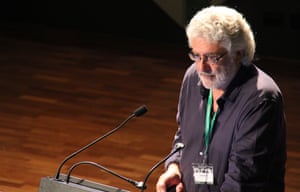Healthabitat cofounder’s work helped cut the number of hospital admissions for illnesses that could be attributed to poor environment

Paul Pholeros, a renowned expert on Indigenous housing and housing equality campaigner, has died aged 63.
Tributes for the award-winning Sydney architect described him as a “courageous and compassionate advocate” and “irreplaceable” for his role in improving health outcomes in Aboriginal communities across Australia.
Pholeros was the co-director of Healthabitat, a not-for-profit organisation he founded with Dr Paul Torzillo and Stephan Rainow after the trio met in 1985 and were given the task of figuring out how to stop Aboriginal people getting sick in the Anangu Pitjantjatjara lands in north-west South Australia.
They developed a model called Housing for Health, which aimed to tackle basic things, such as ensuring every house had a working shower and toilet and access to a laundry.
That work was formalised into Healthabitat in 1999 and in the past 17 years the organisation has delivered 180 Housing for Health projects. They involve working with Aboriginal communities, conducting a survey of all housing and completing urgent repairs using mainly local Indigenous contractors, and adding whatever upgrades or repairs they can afford until the money runs out. Their standard budget is $7,500 per house.
Jon Clements, the president of the Australian Institute of Architects, said Pholeros’s death was a “great loss” to architecture.
“Anyone who had the opportunity to hear him speak about his work could not help but be moved, changed in some fundamental way,” Clements said.
Friends Phil Harris and Adrian Welke, who were both mentored by Pholeros, said he would leave an “enduring legacy”.
“It is impossible to imagine his lean and taut bower and studio high on Bilgola Plateau – the platform refuge shared with his partner Sandra – without his big presence,” they said in a statement released on Tuesday. “It was here, between months on the road, surrounded by bush and a big view, he would recharge, to continue his polite but unwavering 30-year battle against the antipathy and prejudice that precludes our first Australians in sharing our society’s riches of housing, health and education.”
Speaking to Guardian Australia, Welke said Pholeros was “just an incredibly generous, special person. A giant of a man.”
The organisation has improved more than 8,000 houses – a third of Australia’s Indigenous-controlled housing stock – and with them the lives of 55,000 people. A review of its New South Wales projects by the state health department found a 40% reduction in hospital admissions for illnesses that could be attributed to a poor environment.
“People are not the problem,” Pholeros said in a 2013 TEDx talk about the project in Sydney. “We’ve never found that. The problem [is] poor living environment, poor housing and the bugs that do people harm. None of those are limited by geography, by skin colour or by religion. None of them. The common link between all the work we’ve had to do is one thing and that’s poverty.”

